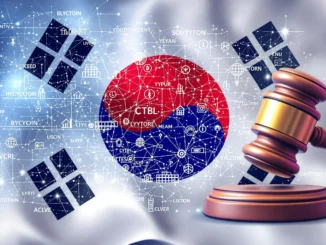
Heads up for anyone involved in promoting crypto exchanges in South Korea! A recent clarification from the country’s top financial regulator could significantly change the game for content creators, influencers, and community managers.
Understanding South Korea Crypto Regulation and VASP Rules
South Korea has been steadily building its regulatory framework for the virtual asset space. A key part of this is the requirement for Virtual Asset Service Providers (VASPs) to register with the Financial Services Commission (FSC) and comply with strict anti-money laundering (AML) and know-your-customer (KYC) obligations. Traditionally, this applied to exchanges, wallets, and transfer services operating within or targeting Korean users.
The recent clarification from the Korean FSC crypto landscape adds a new layer. It suggests that activities previously considered simple marketing could now fall under VASP requirements. This specifically targets those promoting overseas crypto exchanges to users within South Korea.
How Does This Affect Crypto Affiliate Marketing?
This is where things get interesting, and potentially concerning, for many individuals. Crypto affiliate marketing, where someone earns a commission by referring new users to an exchange, is a popular way for influencers, bloggers, and community leaders to monetize their content and audience.
According to BlockMedia’s report, the FSC’s stance indicates that if you are:
- Promoting overseas crypto exchanges
- Targeting users located in South Korea
- Receiving commissions or other benefits for successful referrals
- Engaging in this activity on a continuous and repeated basis
…then your actions could be deemed as operating as a VASP, requiring formal registration.
Continuous vs. Occasional: What Triggers VASP Status?
A crucial distinction highlighted by a lawyer from Lawfirm Renaissance is the nature of the activity. The regulator’s focus appears to be on actions that constitute a ‘business’ rather than a one-off or truly occasional event. The lawyer noted that regulatory oversight is likely for individuals whose promotional activities are “continuous and repeated.”
This implies that a single social media post sharing a referral link might not trigger the requirement, but maintaining a YouTube channel or community group dedicated to reviewing and promoting various overseas exchanges and consistently earning from referrals very well could. The line can be blurry, making this a significant point of concern for active marketers.
Why is South Korea Crypto Regulation Taking This Step?
The move likely stems from the regulator’s desire to protect domestic investors and ensure a level playing field. Overseas exchanges operating without local registration may not adhere to the same stringent AML/KYC or investor protection standards as registered Korean VASPs. By bringing those who funnel users to these platforms under regulatory scrutiny, the FSC aims to limit access to potentially riskier platforms and curb illicit activities.
Potential Penalties and Risks
Operating as an unregistered VASP in South Korea carries significant penalties. These can include substantial fines and even imprisonment. For individuals who have built their livelihoods around promoting crypto exchange affiliate programs, the implications are severe. Non-compliance is not an option.
Who Should Pay Attention?
This clarification is particularly relevant for:
- Crypto YouTubers and streamers in South Korea
- Operators of crypto communities (e.g., Telegram, KakaoTalk groups)
- Bloggers and website owners reviewing or listing overseas exchanges
- Anyone earning regular income from overseas crypto affiliate marketing targeting the Korean market
Even if you are not based in South Korea but actively market to a Korean audience using their language or targeting Korean-specific platforms, you might need to consider the implications.
Actionable Steps for Affected Marketers
Given this development in South Korea crypto regulation, individuals engaged in relevant activities should:
- Assess Your Activity: Is your promotion of overseas exchanges continuous and are you receiving commissions regularly?
- Seek Legal Counsel: Consult with a legal expert specializing in Korean crypto law to understand if your specific activities fall under VASP requirements.
- Review Your Strategy: If your activity qualifies, you may need to cease promoting unregistered overseas exchanges to Korean users or explore the complex and costly process of VASP registration (which is likely impractical for most individuals).
- Stay Informed: Keep track of further guidance or enforcement actions from the Korean FSC crypto division.
Ignoring these potential requirements is risky and could lead to legal trouble.
The Broader Impact on the Korean Crypto Scene
This move could potentially consolidate more trading volume onto locally registered exchanges, which operate under strict regulatory oversight. While potentially increasing investor protection, it also limits the options available to Korean traders who might prefer specific features or tokens available only on overseas platforms. For content creators, it removes a significant monetization avenue unless they pivot to promoting registered local platforms (if affiliate programs exist) or focus on educational content without referral links.
Summary: Navigating the Evolving Landscape
The clarification from South Korea’s FSC is a significant development, signaling the regulator’s intent to broaden the scope of VASP rules. Promoting overseas crypto exchanges through affiliate links on a continuous basis for commission may now require registration, a complex and likely prohibitive process for individual marketers. This highlights the increasing scrutiny on all facets of the crypto ecosystem and the need for participants to stay informed about evolving South Korea crypto regulation. For anyone involved in crypto affiliate marketing targeting the Korean market, understanding these VASP rules South Korea imposes is not just advisable, it’s essential to avoid severe penalties. The landscape is changing, and compliance is paramount.



